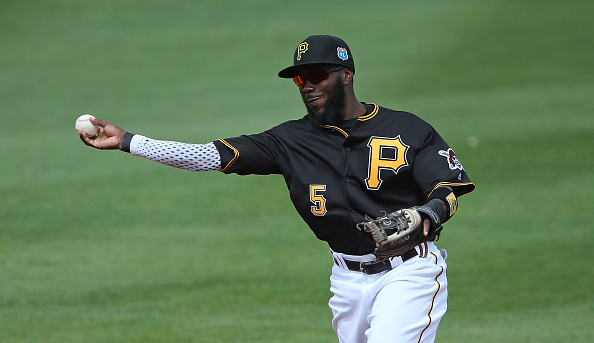With all of the furor surrounding the Neil Walker trade over the winter, this one thought kept sticking out in my head: Josh Harrison didn’t actually hit that much worse than Neil Walker did in 2015.
Certainly, Walker hit for more power than Harrison did, but Harrison hit .287/.327/.390 and Walker hit .269/.328/.427. By wRC+, Harrison was a dead average 100, and Walker was 108. Given that Harrison dealt with injuries and a crowded infield that lead to irregular playing time, that’s not as big of a difference as I expected to find between the two of them. If you roll the clock back to count their stats over 2014 and 2015 (which includes the career years that both Walker and Harrison had in 2014), Harrison hit .303/.338/.446 and Walker hit .270/.335/.446. That’s about as close together as two players can be over two years.
This is not to say Harrison’s a slam dunk to replace Walker’s offensive performance in 2016; Walker obviously has a longer history of hitting at an above-average clip and Harrison’s dip in performance after a breakout year is concerning. Still, if you were to ask me that it was apparent or obvious that Harrison would be a worse hitter than Walker in 2016, I’m not sure that I would say that it was.
All of this being said, a lot of the reason that Harrison wasn’t that far behind Walker last year had more to do with Walker not being as good as you might expect and not Harrison being better than people realized. Harrison was actually awfully close to his performance in 2013, before his big breakout, when he hit .250/.290/.409.
Harrison didn’t quite give back all of his gains last year; his average stayed up thanks to a high BABIP, but that BABIP was up because Harrison’s line drive rate was actually higher in 2015 (24.9%) than it was in 2014 (24%). Harrison doesn’t walk a ton and so he needs to hit for a high batting average; seeing that line drive rate stay up is a really good sign, I think. Like we said with Gregory Polanco yesterday, Harrison’s HR/FB% dropped quite a bit last year (7.7% to 3.4%), which accounts for some of that big drop in slugging percentage.
ZiPS has Harrison down for a .282/.321/.418 line in 2016, which is fine, but not much more than that. By ZiPS that would make him a two-win player, assuming his defense gets back to 2014 levels (he rated out as a negative defensive player last year, but that was mainly due to really poor outfield and shortstop play in small sample sizes; he generally grades out well at second and third base. Personally, I’d like to see a bit more than that from Harrison. I think that last spring I set a .300 batting average as a sort of line of demarcation for him and I’d put it there again; if he can hit .300, his OBP will up around .340, and he’ll be a very strong offensive player. Anything under that and he’ll trend back down closer to average.
Average is probably fine, of course, but there will be some pressure on him to play well enough to keep an every day job. The presence of David Freese could let Kang move around the infield if someone is struggling and Freese is hitting, and Alen Hanson is close enough to the big leagues to be able to hit his way onto the team if the situation calls for it.
In other words, I think this is a big year for Harrison. He’s got an opportunity early in the season to play regularly and prove that he can at least get back in the general direction of that huge 2014 season. If he can, he’s an obvious choice to play second base every day. If he can’t, he’ll likely find himself relegated to super sub again. There’s nothing wrong with super sub, but I think the Pirates are better off with a .300 hitting Josh Harrison in the lineup every day, at least in the near future.
Image credit: Leon Halip, Getty Images




















